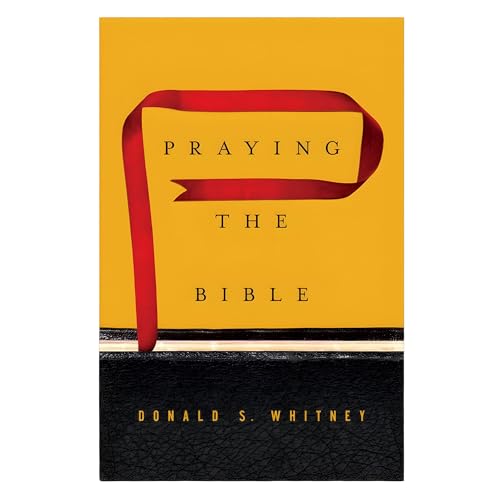Many Christians—even those of us who serve as pastors—would confess that our prayer lives are not what they ought to be. Despite our best intentions and most recent resolutions, we often find that the discipline of daily prayer leads to frustration and guilt rather than freedom and joy. How does something that ought to be considered a privilege become a begrudging obligation? How is it that we, in the words of Donald Whitney, “can be talking to the most fascinating Person in the universe about the most important things in our lives and be bored to death?” (p. 12). In Praying the Bible, Whitney argues that the problem may be as simple as this: we tend to pray the same prayers about the same issues over and over.
According to Whitney, many Christians struggle with prayer because they rehearse the same, worn-out lines every time they go before the Lord. Add the inevitability of praying for similar concerns on a regular basis and the result is, unsurprisingly, boredom and frustration. Whitney warns, “Prayers without variety eventually become words without meaning” (p. 17). The solution to a boring prayer life is an adjustment in method that centers on the text of the Bible. As Whitney seeks to demonstrate, praying through a passage of Scripture is a simple way to fight distractions and enhance your daily prayer life.
He describes the process as follows: “To pray the Bible, you simply go through the passage line by line, talking to God about whatever comes to mind as you read the text” (p. 33). By using the text as a guide, you never run out of things to pray about and you never pray the same prayer twice! The Psalms are particularly helpful for this approach because they were originally inspired to be sung back to God and because they cover the full range of human emotions. As Whitney points out, “God has inspired a psalm for every sigh of the soul” (p. 54). He advocates for a systematic approach to working through the Psalms that involves skimming five chapters each day and then choosing one to guide you through prayer. This method exposes you to the full Psalter over the course of each month and helps reinforce the applicability of the Scriptures to everyday life.
After describing how to pray through the Psalms, Whitney provides additional instruction for praying through other genres of Scripture before challenging the reader to put down the book and put this method into practice. He implores his readers to take him up on this challenge because he knows that praying the Bible is best learned through experience. He has presented this material in churches around the country and has observed how helpful it can be. A full chapter outlines the typical reactions people have to praying the Bible for the first time, which serves as additional encouragement for readers to try it themselves.
The most controversial aspect of Whitney’s approach to praying the Bible is likely to be his contention that you are free to pray about whatever comes to your mind as you read, even if it is not an appropriate application of the passage itself. Some may fear that this allowance subtly provides grounds for unfettered eisegesis, but this concern is unfounded. As Whitney demonstrates, there is a difference between interpreting the Bible and praying the Bible. The former is concerned with ascertaining God’s intended meaning for the text, whereas the latter is “merely using the language of the text to speak to God about what has come into your mind” (p. 36). As Christians, we are free to present all our concerns to the Lord and could feasibly use any biblical passage to guide us through this process.
Whitney aims to be practical rather than exhaustive in this brief volume. When readers raise questions not addressed in the text—what about the role of God’s judgment in hindering one’s prayers (1 Pet 3:7), for example—it is helpful to recall this purpose. The book’s simplicity does not weaken its effectiveness though. It is intended to underscore the sufficiency of the Scriptures for informing and inspiring spirituality.
Written in an engaging style with a pastoral tone, Praying the Bible could easily be completed in a single setting but its wisdom can be applied for years to come. Whitney reminds believers that God has not intended the experience of prayer to be complicated or boring. By targeting the practical challenges to consistent prayer, he has produced a book that is likely to benefit young Christians as much as seasoned saints. As someone who has personally benefited from praying the Bible using Whitney’s method for years, I am thankful to see this resource available to a wider audience.
Matthew D. Haste
Matthew D. Haste
Columbia International University Seminary & School of Ministry
Columbia, South Carolina, USA
Other Articles in this Issue
Psalm 90 tells us that our lives are ever so brief and it also tells us why...
John Barclay’s Paul and the Gift is one of the most important books on Paul’s theology in years...
This article addresses the question: How does the LXX relate to the Christian Old Testament, and more specifically, what role does the LXX play in Christian biblical theology? The first part of the article is a brief overview of five different approaches to the role of the LXX in a whole-Bible biblical theology...
The Problem of Repentance and Relapse as a Unifying Theme in the Book of the Twelve
by Gary E. YatesThis article builds on earlier studies highlighting repentance and return as unifying themes in the Book of the Twelve by developing a pattern of repentance and relapse that emerges from a reading of the Twelve...
Modern scholars charge that the traditional view of divine impassibility had been corrupted with Greek philosophy and thus strayed away from Scripture’s testimony of the true God...







